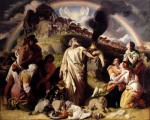Yesterday we briefly looked at the Calvinistic understanding of Genesis 6:5 and Genesis 8:21, and how they use these verses to defend the doctrine of Total Depravity. In this post I want to look at how these verses can be understood differently.
Learning what these texts mean begins with seeing them in the context of the the flood, and the events leading up to the flood.

The Point of the Flood Account in Genesis 6-8
One primary point of Genesis 6–8 is to show what humanity has done with the knowledge of good and evil gained by eating the forbidden fruit in the Garden of Eden. It has not brought anything good, but has resulted in only evil, violence, death, and destruction.
This point is proved by the fact that Genesis 6:5 and Genesis 8:1 form an inclusio around the flood account of Genesis 6–8. An inclusio is a form of writing which emphasizes the point of a text by putting the main idea at the beginning and end of a text to serve as “bookends” around the text. These bookends draw the attention of the reader to the main theme of the text.
Since the account of the flood begins and ends with two verses about the universal sinfulness of humanity, these two texts are making a critical point about the reason and results of the flood. What is most surprising is the point that is made. Genesis 6:5 is written to provide an explanation for why the floodwaters came upon the earth. The idea is that the waters cover the earth because violence covered the earth (Gen 6:11).
The Flood Did Nothing to Fix the Problem of Sin
Yet after the event of the flood, God says the most startling thing: Despite having nearly wiped humanity off the face of the earth, the drastic measure of the flood did nothing to fix or correct the human condition. All the thoughts and imaginations of man’s heart is still only evil, even from youth (Genesis 8:21).
The sinfulness of humanity after the flood is the same as the sinfulness of humanity before the flood!
Does it mean that God failed in His attempt to wipe evil off the face of the earth?
No, it means something else entirely.
It means that while death and destruction is the result of evil, death and destruction cannot solve the problem of evil either. It is always a temptation for individuals, rulers, and governments to think that they can defeat evil with violence, but here, in three of the opening chapters of the Bible, we are told that violence and destruction does not and cannot eradicated evil.
But beyond this, the fact that evil continued to exist in the hearts of men after the flood serves as a warning for all who live after this terrible event.
 Through the story of the flood, the author of Genesis is telling his readers to understand that when we form our thoughts after evil instead of after God, only death and destruction follows. Noah serves as a positive example of what happens to those who follow God and faithfully obey Him, even though the entire surrounding society and context is engaging in evil continually.
Through the story of the flood, the author of Genesis is telling his readers to understand that when we form our thoughts after evil instead of after God, only death and destruction follows. Noah serves as a positive example of what happens to those who follow God and faithfully obey Him, even though the entire surrounding society and context is engaging in evil continually.
Genesis 6-8 is Not Teaching Total Depravity or Total Inability
When read this way, Genesis 6–8 is not a passage about humanity’s inability to hear God or follow Him, but rather, is the exact opposite!
Genesis 6–8 is a text which warns the reader that if they form the thoughts of their hearts after evil, only death and destruction will result.
If, however, like Noah, they form their thoughts after righteousness and godliness, they will find grace in the eyes of the Lord, and He will guide them, protect them, and even deliver them from the floods of violence and destruction that come upon the evildoers.
Due to God’s destruction of humanity in the flood because of the sin which is described in Genesis 6:5, some might be tempted to think that God had wiped out evil for God. But Genesis 8:21 proves that just as evil existed before the flood, it exists after the flood as well.

Evil is all around us and even in our own hearts, but we must choose whether to form our hearts after evil, following those who died in the flood, or form our hearts after righteousness, like Noah who survived the destruction of the flood.
So although Genesis 6–8 does reveal that sin and depravity lie within the hearts of all people, these chapters also include a call for all people to form the thoughts and imaginations of their hearts after the holiness and righteousness of God, rather than after the evil and wickedness of the world.




It never ceases to amaze me how simple the Bible can be when it is taken in context and not interpreted based on “theological” presuppositions. Thanks Jeremy for making the passage so clear.
Yes, I agree. I am really struggling writing some of these posts because it is so unnatural to approach biblical texts with a goal to argue against a theological presupposition which is (mis)using the texts to defend their views. If I were writing commentary on these texts, much of what I am writing in these posts would never come up because these Calvinistic ideas are not naturally found in them.
I agree with you John. And thanks Jeremy – once again a difficult topic handled well in simple contextual sense.
What a beautiful exposition of the passage. Thank you.
You’re opening my eyes with this series on Calvanism. It’s helping me understand the rants of a more than a few hardline atheists.
What you are writing about is “conditional acceptance” through your own WORKS of righteousness.
Noah’s righteousness is not the samething as “sinless” nor “perfection”
Because Noah found favor of God or Grace in the eyes of God, he was saved along with
his family. Scripture is pretty clear on all falling short and men’s heart being clearly
evil..
I agree with the way you explain the context. But then you say
“If, however, like Noah, they form their thoughts after righteousness and godliness, they will find grace in the eyes of the Lord.”
That is semi-Pelagianism at best, if not salvation by works. The grace of God cannot be earned.
Does the text say why Noah found grace from God? NO. But you’re assuming it’s because his thoughts and deeds were righteous. What happened to the sola fide you said you subscribe to?
I don’t mention anything about the works of Noah earning him (or us) grace. You are reading this into my post and adding to my words, making incorrect assumptions about what I believe. Furthermore, “finding grace in the eyes of the Lord” is not the same thing as gaining eternal life. The grace of God is manifested and experienced in a variety of ways. Don’t make the mistake of thinking that just because the word “grace” is mentioned, this means that the text is referring to the free gift of eternal life.
Some object that Genesis 6:5 and 8:21 are only describing the sinfulness of that time, not a general principle. But while the “wickedness” – the actual visible sins – might be greater or lesser during different times, like in the first half of verse 5, the human heart hasn’t changed. Also, in several other OT verses, quoted by the Apostle Paul, in Romans 3, the conclusion is the same as in verse 5 here. Finally, the story of the flood not only begins with this sweeping statement about our sinfulness, it ends with a similar statement, in Genesis 8:21. All our inclinations are evil. And it adds, from youth. In other words, the flood story is preceded and concluded by a statement that the human heart is inclined towards evil.
Notice that sentence, how air-tight it is. It is like it was written by a lawyer to close any loop-holes. First, the heart of the problem. The heart of the problem is the problem of the heart. The direction our thoughts are oriented. The NIV has “inclination”; the ESV has “intention.” The word there, “inclination” or “intention,” means either, intend, purpose, your frame, the reason why you do this or that. Why you eat or drink or whatever you do, you do it, without God’s grace, for the glory of self, for evil. So, it’s not just actions. It’s inclination, in the heart. It’s the motive of why you do what you do. The way our hearts lean, if they have not been transformed by God, is wrong.
Notice the adjectives and adverbs particularly, in second half of verse 5, three of them: “every,” “only,” and “continually.” “Every” inclination without exception. It’s not some or most intentions, but all. Not even that merely some thoughts are off target, a mix of good and bad motives. No, every inclination is evil. Without God’s grace, even our motive to go to church is about glorifying self, some advantage we can get out of it. In some bigger churches, people will go to make business contacts, sell Am-way; politicians go because it makes them look good. Every one of those motives, not about loving and obeying God, are evil.
Not only are they evil without exception, they are evil with any mixture of something good. Our intentions are “only” evil. The word literally means “altogether.” They’re not just partly evil but altogether, in their entirety, evil. It’s not just that every inclination is infected with evil but there’s also some good mixed in there with our evil intentions. No. Our inclinations are “only” evil.
“Continually,” not just some of the time; not even just a majority of the time but maybe if you catch me in a good mood, after my coffee, I’ll have better intentions. No. All our intentions are evil all the time. And not just after a so-called “age of accountability.” “All the time” means all our lifetime, from the moment of conception. Psalm 51:5 says, “Behold, I was brought forth in iniquity, and in sin did my mother conceive me.” We are, without God graciously working in us, continually off target, continually going the wrong way, away from God.
I was looking for a chronological, scriptural proof of man’s corrupted nature and transmission of sin nature because of Adam’s one sin and you have a very different understanding of the purpose of the narrative in Genesis. “If, however, like Noah, they form their thoughts after righteousness and godliness, they will find grace in the eyes of the Lord,” sounds like grace is based on being righteous and godly. If they are righteous and godly, then the righteous God will declare them not guilty and no harm will be done to them. A just God owes them that and not mercy or favor. That is their wages. However, if God favored them, and kept Noah righteous and blameless, then Noah owes it to God. Genesis 6:8 But Noah found favor in the eyes of Yahweh. Noah is slave of sin as the next chapters would show us, so are his sons, so are all the sons of Adam, save Christ. We are slaves and under bondage to sin until Christ sets us free. Read John Carpenter’s comment after I wrote my comments. They are air tight arguments for the case of Total Depravity.